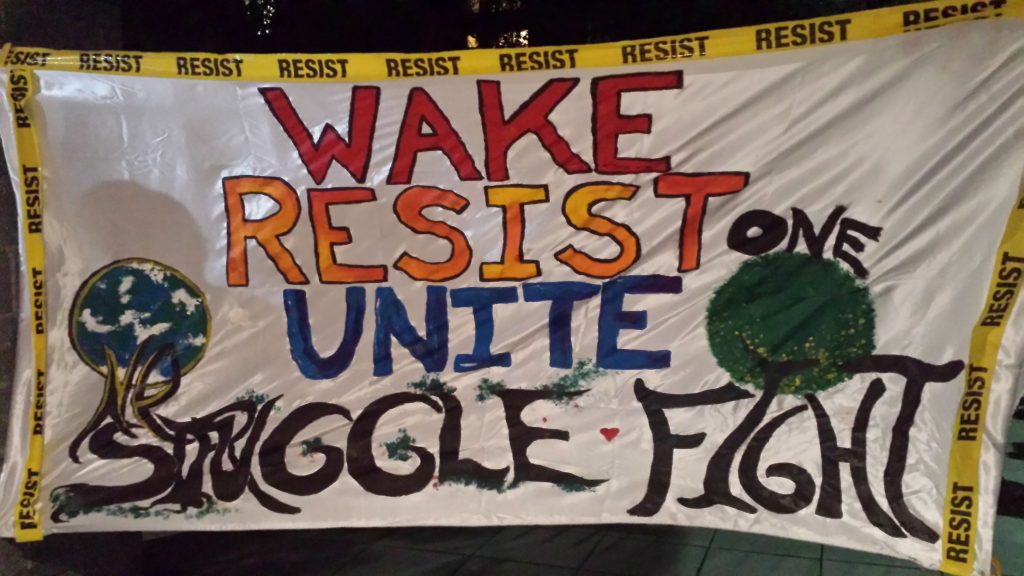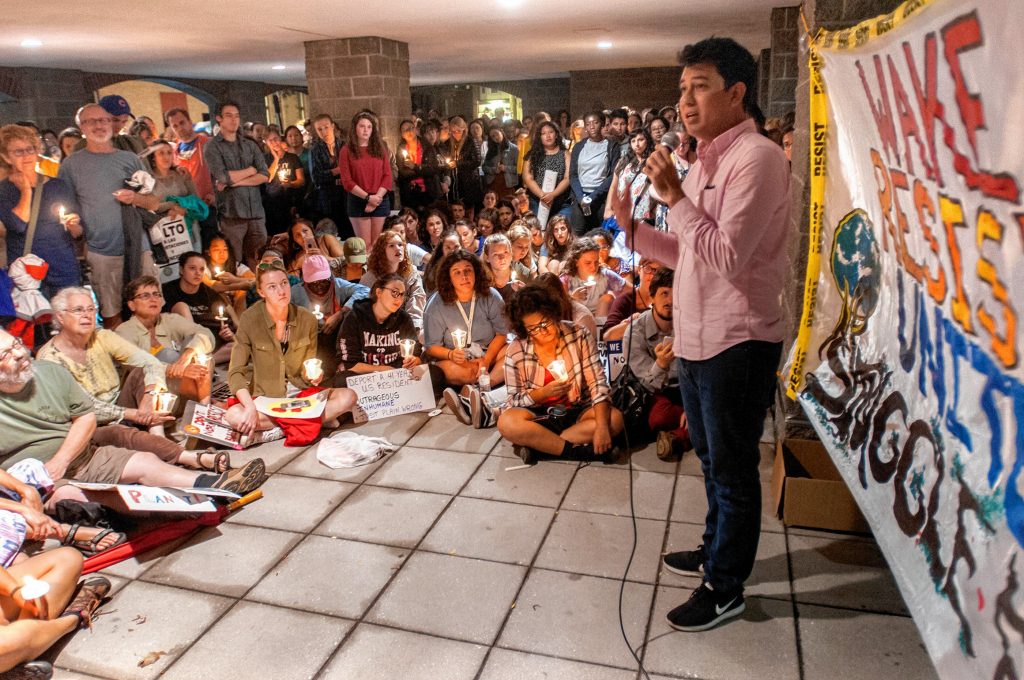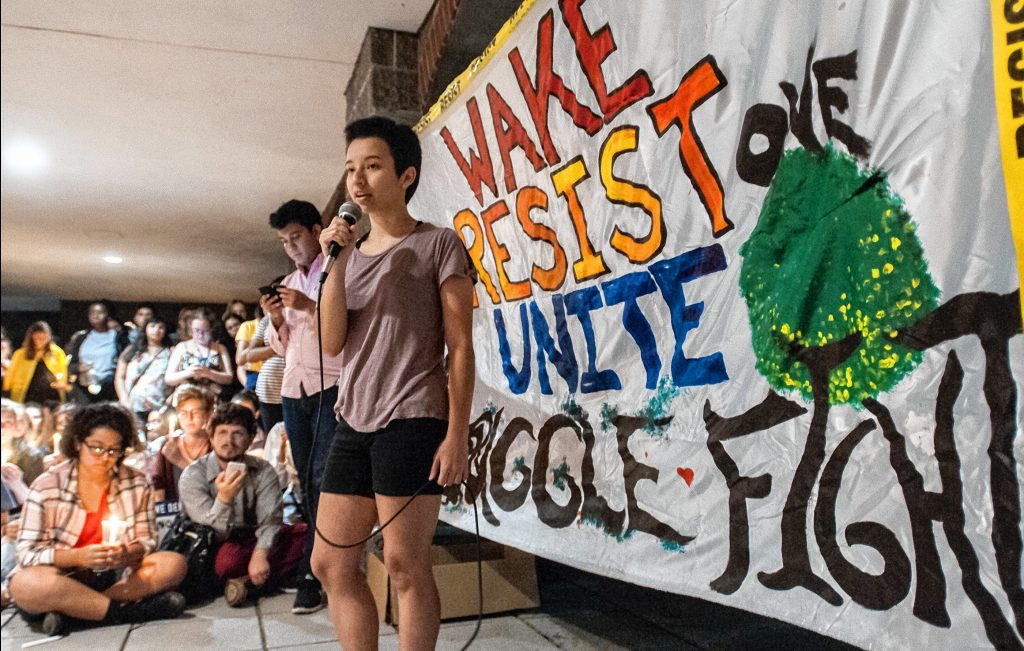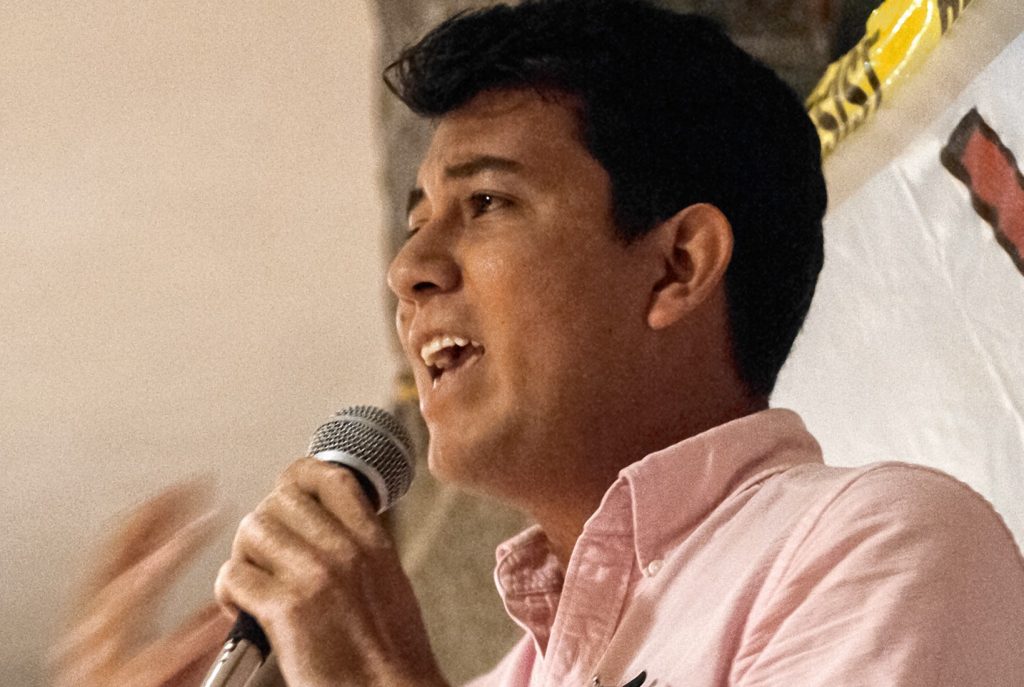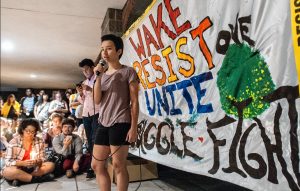As student president of his high school class in Georgia, Eduardo Samaniego sat on stage at graduation next to his principal as he and his classmates received diplomas. But in a cruel twist, he couldn’t apply to his top pick school — the University of Georgia — because he does not have a social security number. With tears in his eyes, he said all of his hard work and essays and extracurricular activities didn’t matter.
“I was watching everyone grab their diplomas and I knew that I wasn’t going to college,” he said.
Now, after years of saving money and speaking up for immigrant rights, he is a third-year student at Hampshire College. But even in liberal Massachusetts, he said immigrant rights are in short supply.
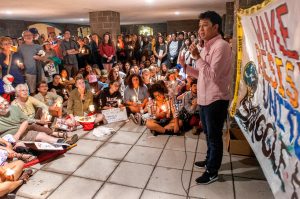 He addressed a hastily organized Northampton rally protesting President Donald Trump’s decision to wind down the Deferred Action for Childhood Arrivals (DACA) program in six months. The executive order provided about 800,000 undocumented young people protection from deportation, and access to driver’s licenses, work permits, and in-state college tuition.
He addressed a hastily organized Northampton rally protesting President Donald Trump’s decision to wind down the Deferred Action for Childhood Arrivals (DACA) program in six months. The executive order provided about 800,000 undocumented young people protection from deportation, and access to driver’s licenses, work permits, and in-state college tuition.
Much of the anger for ending the program has been focused on Trump, but Massachusetts state lawmakers deserve scrutiny for failing to pass protections for undocumented immigrants at the state level. Samaniego called them out at the rally.
The Massachusetts Legislature, “has been over supermajority Democrat, yet they haven’t passed anything that benefits the most vulnerable in this state,” he said. “Now we want you to urge the president of the Senate — Stan Rosenberg — to introduce legislation that would pass a Massachusetts DREAM Act.”
The federal DREAM (Development, Relief, and Education for Alien Minors) Act, first introduced in Congress in 2001, would have granted those who entered the United States as children legal residency and work status and potentially a path to citizenship, remains in limbo. Obama implemented DACA without the backing of Congress in 2012 after more than a decade of inaction on the legislation.
Samaniego said he is tired of hearing that politicians plan to release statements in response to Trump’s policies.
“We don’t want statements anymore. We want action,” he said.
So we called them up ourselves to find out what they plan to do about the 8,000 DACA enrollees and the estimated (by Pew Research) 210,000 undocumented immigrants in Massachusetts.
Rosenberg, an Amherst Democrat whose district includes mostly communities in Hampshire and Franklin counties, said his office has started to receive demands for action on state legislation supporting undocumented immigrants.
“There are pieces the state could try to do, but we couldn’t do everything the DREAM Act provides for,” Rosenberg said. “The biggest element is actually the work permit, and the state can’t issue a work permit — only the federal government can.”
At the same time, the state does have a purview over driver’s licenses and in-state tuition, and many states have laws granting them to undocumented immigrants. According to the National Conference of State Legislatures, 18 states allow in-state tuition for undocumented students — including blue states like California, New York, and Washington, but also several red states like Texas, Utah, Nebraska, and Kansas. There are 12 states that allow undocumented individuals to have driver’s licenses.
Massachusetts does not allow either. Undocumented Bay Staters rely on DACA for both of those rights. If DACA ends without a replacement, those who protections could be lost.
Rosenberg said the Senate will consider legislation for both driver’s licenses and in-state tuition, but added that the federal government should vote and pass the national DREAM act.
“To become a participant in the DACA program, you can’t have had any criminal activity, so these people in the program have done nothing but be what everyone wants our young people to be — engaged in their studies, getting a job, being active in their community, building a life and a family,” he said. “Now to threaten them with deportation at the end of six months is unconscionable.”
Symbolic politics
Regarding passage of a Massachusetts DREAM Act that would grant legal residence and work status, Rosenberg said such a law would be largely symbolic.
“To pass a law that you know is not going to withstand a court challenge is an exercise you could undertake, but it would push other things off of the agenda upon which you could act that would make a concrete difference,” he said.
He said having Massachusetts Attorney General Maura Healey sign on to a lawsuit fighting the possible end of DACA, which she did soon after Trump’s announcement, was more productive. The lawsuit, joined by 16 Democratic attorneys general of 15 states and the District of Columbia, states that Trump’s past comments against Mexicans show the sunset of DACA was motivated by discriminatory reasons.
Rebecca Hamlin, assistant professor of legal studies in the University of Massachusetts Amherst political studies department, disagreed.
“It is symbolic politics,” Hamlin said of the lawsuit to save DACA. “I would be pretty shocked [if it succeeds].”
DACA, which was put in place by executive order, can be removed by executive order, she said. Otherwise, future presidents might not be able to overturn executive orders put in place by Trump, she said.
Hamlin agreed with Rosenberg that immigration law is mostly in the purview of the federal government. But she added that immigration law is confusing and complicated, and legal challenges regarding immigration have become a cottage industry in the legal field. She said there are several things states can do, including legalizing driver’s licenses and in-state tuition for undocumented immigrants, and establishing Massachusetts as having “sanctuary” status — a nebulous term that generally means local law enforcement will not enforce federal immigration laws.
But the fact that Massachusetts has not enacted many of the state-level protections put forward by other states was not surprising to Hamlin.
“Massachusetts is not California,” she said, citing California’s large immigrant and minority populations. “Massachusetts is a liberal, progressive state, but it is a white state.”
As a result, there is much that Massachusetts’ State Legislature could do to emulate other states, and targeting state-level politicians could be a good tactic for activists, she said.
“There hasn’t been a lot of focus on the State Legislature,” Hamlin said. “If people in the State Legislature say ‘I support DREAMers and I support a path to citizenship,’ there’s a lot of things they can do besides saying that.”
Rallying for rights
 At the rally outside the Pioneer Valley Workers Center in Northampton, held on Sept. 5, the day Attorney General Jeff Sessions announced Trump’s winding down of DACA, speakers told their stories before a huge banner reading “WAKE RESIST UNITE STRUGGLE FIGHT.” People held up signs of their own, which read “We’re here to stay!” and “Justice, respect, and dignity for all!” As speakers came to the microphone, others passed out candles, which cast a glow on those around them.
At the rally outside the Pioneer Valley Workers Center in Northampton, held on Sept. 5, the day Attorney General Jeff Sessions announced Trump’s winding down of DACA, speakers told their stories before a huge banner reading “WAKE RESIST UNITE STRUGGLE FIGHT.” People held up signs of their own, which read “We’re here to stay!” and “Justice, respect, and dignity for all!” As speakers came to the microphone, others passed out candles, which cast a glow on those around them.
More than 250 people attended, and among them was a 32-year-old man from Ecuador who declined to give his name because he is undocumented. Speaking Spanish, he said he is new to political activism, but he felt it is important with Trump as president.
“He is very racist, but unfortunately there are people who support him,” he said through an interpreter regarding the president. “I believe that we can’t just sit down; we have to organize ourselves and unite.”
Many of those in attendance were students from local colleges. Renee Revolorio Keith, Yacine Fall, and Anjali Asha Bisuas came from Smith.
Fall said that in part, anger brought her to the rally.
“This is really heartbreaking for me to see, that they would take away the rights of people who have been here for so long,” she said.
Keith said she has many friends who are undocumented.
“I feel like they deserve this country more than I do because they fought for it and I was just given it,” she said. “I feel like I also easily could have been undocumented and it is just a matter of circumstance that I’m not.”
For Bisuas, coming to the protest was as important as going to class.
“This is just as relevant to everyone involved, and in particular to the Latino community,” she said.
Angelica Monge, one of the speakers at the rally, spoke about the benefits she received from the DACA program. After coming into the country at the age of 12 from El Salvador, Monge didn’t have the protections DACA afforded, and she talked about the difficulties she had attending Holyoke Community College.
“Not only did I have to work under the table, but I also had to pay out-of-state tuition even though I was a Massachusetts resident for a long time,” she said.
DACA’s passage allowed her to graduate from Holyoke Community College and she now hopes to work as an immigration advocate. If DACA is taken away, it would jeopardize her ability to get a job.
In sharing her story, Monge added that she does not believe she is more deserving than other undocumented immigrants for protections. That includes the parents of DACA individuals, who she said some people are demonizing for bringing their children across the border.
“Everyone deserves to not be afraid of where they go and who they are,” she said. “How we feel about our parents is that we’re grateful. They brought us to another country for us to be safe.”
Smith student Diana Umana, another DACA enrollee and rally organizer, said she opposed the end of DACA and especially the way that the country’s head of the Justice Department, Jeff Sessions, talked about it.
“All the language that was used, all that Jeff Sessions said calling us ‘illegal aliens’ — we’re not ‘aliens’ and no human being is illegal,” she said. “Just because this is coming from the Department of Justice does not mean it is just.”
Samaniego, another organizer, added that both he and Umana came from Georgia, a conservative state.
“We couldn’t apply to the University of Georgia and that is why we are here in Massachusetts,” Samaniego said. “But as much as we want to tell you that the state of Massachusetts is better, we have nothing to show for it.”
What he wants for the Massachusetts undocumented population are driver’s licenses and in-state tuition.
“They are telling us they want to take action,” he said of people from Massachusetts. “That is how they can act.”
At the Statehouse
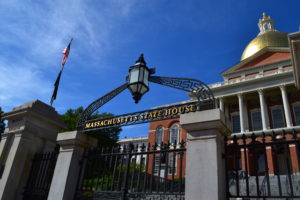 State Rep. John Scibak, (D-South Hadley), said the president’s actions combined with Congress’s inaction put the State Legislature in a pickle.
State Rep. John Scibak, (D-South Hadley), said the president’s actions combined with Congress’s inaction put the State Legislature in a pickle.
“The president says he is repealing it and what is going to happen over the next six months — what Massachusetts may or may not do — is going to be affected in some degree by what Congress does or does not do,” he said.
Scibak, who believes those in the DACA program should retain their protections, said no bill has been filed to allow undocumented immigrants to have driver’s licenses or to receive in-state tuition, but said those bills could be filed and that he would be supportive.
He added that what Gov. Charlie Baker’s position is going to be will affect things as well. Baker, a Republican, issued a statement following the announcement that DACA would wind down saying that Trump “made the wrong decision.”
“I hope Congress acts quickly to find a bipartisan, permanent solution to maintain the protections of Deferred Action for Childhood Arrivals recipients, which includes approximately 8,000 young Massachusetts residents who are right now serving in our military, attending our schools and contributing to our economy while striving to give back to their communities,” the statement read.
Baker declined to comment on whether the state should take up portions of a state-level DREAM act, and has in the past opposed driver’s licenses for undocumented immigrants and signed legislation in 2016 requiring proof of legal status for driver’s licenses.
At the same time, Scibak said that passing protections at the state level has appeal, especially if Congress fails to act. If the state passes protections when the federal government does nothing, Scibak mused that it could be a difficult question for the country’s courts.
“Why are you deporting people from Massachusetts, when we have taken steps Congress has not done nationally?” he asked.
On higher education, where Scibak is a committee chair, and on health care, Democrats also have opportunities to enact state legislation to counter a conservative agenda in Congress. Scibak said he had recently come around on a state bill for single-payer health care, which could head off a future Obamacare repeal, and that there are a number of bills he is considering for making higher education more affordable.
The difficulty for the progressive bills is a limited budget, he said.
“The question in the grand scheme of things is what is the priority — do you let people who were formerly insured go uninsured and instead offer free tuition to everyone?” he said. “That’s the dilemma we face every year. There is never enough money to go around.”
Rep. Jose Tosado, (D-Springfield), said he believes Massachusetts is being a counter force to some of the hard-right policies that are coming out of Washington.
What he said about DACA is that he has worked with immigration rights organizations over the years to implement driver’s licenses and in-state tuition, but bills that have been filed have been tied up in committee in the past.
“It is never enough,” he said. “I think we’re a progressive commonwealth and I think we understand what our legal and moral rights are. Some legislation doesn’t get the light of day, but we keep working on it.”
On a Massachusetts DREAM Act, Tosado said he was supportive and would likely be a “Yes” vote depending on the language — if such a bill were drafted. He added that he believed many Democrats would be supportive at the state level.
At the same time, freshman Rep. Solomon Goldstein-Rose, (D-Amherst), predicted opposition to driver’s licenses, though he said he would likely be supportive.
“I think that it would face significant challenges in the Legislature given the polarized conversation around immigration,” he said. “Even the word immigration is really toxic in the Legislature and it may get a lot more attention than usual but may also get a lot more pushback than usual.”
For Rosenberg, protecting Massachusetts residents who signed up with DACA will be a priority, he said.
“I’m going to encourage to do everything we can to try to protect these individuals as best we can within the powers the state has,” he said. “Overall this is a continuing pattern by the federal government — an inactive Congress and a president who knows no bounds or limits to actions that hurt people for no good reason.”
Samaniego said that unlike his home state of Georgia, there aren’t proposed laws trying to take away immigrant rights. But at the same time, there isn’t anything forward looking either.
“I see ‘resist,’ ‘welcome your neighbor’ and rhetoric that says ‘we are progressive,’ but we have not been able to pass [a state-level] DREAM Act, and people have tried before,” he said.
Dave Eisenstadter can be reached at deisen@valleyadvocate.com.


